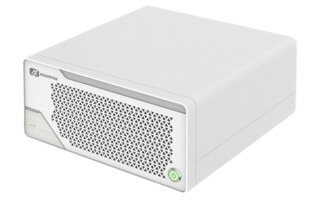Bullet Proof Your Industrial Hardware Systems with Built-in Cybersecurity
August 04, 2020
Story

Cyberattacks on computerized industrial control systems (ICS) are especially dangerous since ICSs control the distribution and movement of energy and other high-value assets.
Cyberattacks are becoming more prevalent and have serious consequences, ranging from financial loss and environmental disasters to injury and possible loss of life. Cyberattacks on computerized industrial control systems (ICS) are especially dangerous since ICSs control the distribution and movement of energy and other high-value assets.
There are four types of cyber threats:
- Adversarial
- Accidental
- Structural
- Environmental

Major Types of Cyber Threats and Their Consequences.
Source: NIST Special Publication 800-82. Rev. 2)
According to the National Institute of Standards & Technology (NIST), engineers should address security throughout the life cycle stages of the ICS, separate the corporate and the ICS networks, and keep the most critical communication in the safest layer of the multi-layer architecture. Also, data should be stored, transferred, and analyzed with cryptographic algorithms. Moreover, the ICS should have restricted and privileged access-and have security controls to prevent, deter, detect, and mitigate the cyberattacks.
ICSs have broad applications in critical infrastructures, such as the electric grid, hydro, oil and natural gas, transportation, chemical, pharmaceutical, food and beverage, and automotive and aerospace manufacturing. The industrial Internet of Things (IIoT) will reduce data transfer delays and enable faster data processing by ICSs.
However, the increase in connectivity also brings more risk. Threats to ICSs can be adversarial, coming from hostile governments, terrorist groups, disgruntled employees, and malicious intruders. Threats can be accidental or environmental from natural disasters. Such attacks can affect data integrity, data accuracy, system operation or even workplace or worker safety.
Major Security Objectives for an ICS
The security of an ICS should restrict local and physical access to its network and devices, protect individual ICS components (central computers, sensors, and data transfer apparatus), restrict unauthorized modification of data and restore the system after adverse incidents. There should be proactive mechanisms for detecting security events and maintaining functionality during adverse circumstances.
Cybersecurity Needs Strong, Rugged Hardware and Software Systems
Cybersecurity is a complex problem that involves multiple functionalities. Computer scientists, electrical engineers, electronic warfare experts, intelligence analysts, and system engineers need to work together to build effective custom security solutions.
At the heart of an ICS system is an industrial cybersecurity edge device. It is used to control and automate ICSs. Another important function is to protect the ICS from cyber threats. The industrial cybersecurity edge device, whose purpose is processing, collecting and storing data, should also include software capable of data analysis and the flagging of unusual transactions.
Any network security solution for ICSs needs to work in real-time and support encryption across all communication layers so that only safe message traffic flows among critical System Control and Data Acquisition (SCADA) systems.
When centralizing, integrating, and correlating the cyber data, the security solution must rapidly identify patterns and detect and triage cyber threats. In addition to having an open system architecture, network security software should be easily customizable to different scenarios and provide tailorable security dashboards. The software solution also needs to be compatible with the hardware to achieve synergized data protection.
Software Applications Need Robust Hardware Support
Industrial control system (ICS) applications can only realize their maximum potential with powerful IIoT hardware / industrial embedded computer support. For example, because there are many different scenarios and applications, it is not possible to write new and different software for each situation. The most cost-effective and efficient solutions enable installing the same software in a flexible hardware environment and tailoring the whole package for various applications.
Industrial embedded computers play an essential role in ensuring ICS security by monitoring and tracking transactions as well as by identifying suspicious activities. Security software that industrial edge devices use to analyze collected data must be supported by hardware that is flexible, ruggedized, reliable and has extended product availability. Lastly, support is needed during the design and development process to customize the hardware for the software.
Developers and software solution providers rely and count on companies like ADL Embedded Solutions for their products and services for protection from these cyber threats.




